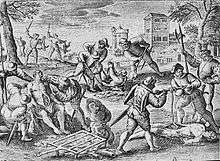Richard Rowlands
Richard Rowlands, born Richard Verstegan (c. 1550 – 1640), was an Anglo-Dutch antiquary, publisher, humorist and translator. Verstegan was born in East London the son of a cooper; his grandfather, Theodore Roland Verstegen, was a refugee from Guelders who arrived in England around the year 1500.[1]
Biography
Under the patronym Rowlaunde, Richard went to Christ Church, Oxford,[1] in 1564, where he may have studied early English history and the Anglo-Saxon language. Having become a Catholic, he left the university without a degree[1] to avoid swearing the Oath of Supremacy. Thereafter he was indentured to a goldsmith, and in 1574 became a freeman of the Worshipful Company of Goldsmiths. In 1576 he published a guidebook to Western Europe, translated from German, entitled The Post of the World.[1]
At the end of 1581 he secretly printed an account of the execution of Edmund Campion but was discovered and 'being apprehended, brake out of England'. In exile he resumed the surname of Verstegen (Anglicized Verstegan). While in Paris he was briefly imprisoned at the insistence of the English Ambassador;[1] in Rome, he was the recipient of a short-lived pension from the pope. In both of these cities he published accounts of the suffering of priests in England.
In 1585 or 1586 he moved to Antwerp, and set up in business as a publisher and engraver,[1] an intelligencer, and a smuggler of books and people. From 1617 to about 1630 Verstegan was a prolific writer in Dutch, producing epigrams, characters, jestbooks, polemics. He also penned journalistic commentaries, satires and editorials for the Nieuwe Tijdinghen (New Tidings) printed in Antwerp by Abraham Verhoeven from 1620 to 1629.[2] This makes him one of the earliest identifiable newspaper journalists in Europe. He spent the rest of his long life in Antwerp, dying there in 1640.
Works

- Theatrum Crudelitatum haereticorum nostri temporis (= Theatre of the Cruelties of the heretics of our time) (1587)
- A Restitution of Decayed Intelligence in Antiquities concerning the most noble and renowned English Nation (1605; reprinted 1628, 1634, 1652, 1655, 1673). This includes the first English version of the story of the Pied Piper of Hamelin.
- Nederlantsche Antiquiteyten (1613; further editions 1631, 1646, 1662, 1700, 1701, 1705, 1714, 1725, 1733, 1756, 1809); an adaptation of the Restitution of Decayed Intelligence
- Neder-duytsche epigrammen op verscheyden saecken (Mechelen, Henry Jaye, 1617) – a volume of epigrams, available on Google Books
- Sundry Successive Regal Governments in England (1620)
- Spiegel der Nederlandsche Elenden (1621)
- Scherp-sinnighe characteren. Oft subtijle beschrijvinghe (Antwerp, Willem Lesteens, 1622). Available on Google Books
- Medicamenten teghen de melancholie (published by Hendrick Aertsens, 1633)
The verses on the defeat of the Irish rebels under Tír Eoghain, entitled England's Joy, by R. R. (1601), have mistakenly been attributed to him.
References
- Chisholm, Hugh, ed. (1911). . Encyclopædia Britannica. 23 (11th ed.). Cambridge University Press. p. 787.
- Paul Arblaster, From Ghent to Aix: How They Brought the News in the Habsburg Netherlands (Leiden and Boston, 2014), pp. 92-93. Partial view on Google Books.
- Oxford Dictionary of National Biography article by Paul Arblaster, ‘Verstegan [Rowlands], Richard (1548x50–1640)’, 2004 accessed 5 Nov 2006
- Arblaster, Paul (2004). Antwerp and the World. Richard Verstegan and the International Culture of Catholic Reformation. Leuven: Leuven University Press.
- Bremmer jr., Rolf H. (2000). "The Anglo-Saxon Pantheon According to Richard Verstegen (1605)". In Graham, Timothy (ed.). The Recovery of Old English. Anglo-Saxon Studies in the Sixteenth and Seventeenth Centuries. Kalamazoo. pp. 141–172.
- Clement, Richard W. (1998). "Richard Verstegan's reinvention of Anglo-Saxon England: A contribution from the Continent". In Gentrup, William F. (ed.). Reinventing the Middle Ages & the Renaissance: Constructions of the Medieval and Early Modern Periods. Brepols. pp. 19–36. ISBN 2-503-50804-9.
- Kendrick, Thomas (1950). British Antiquity. London: Methuen & Co. Ltd. pp. 116–20.
- Zacchi, R.; Morini, M., eds. (2012). Richard Rowlands Verstegan: A Versatile Man in an Age of Turmoil. Brepols. ISBN 9782503535753.
External links
| Wikisource has original works written by or about: Richard Rowlands |
- Works by or about Richard Rowlands in libraries (WorldCat catalog)